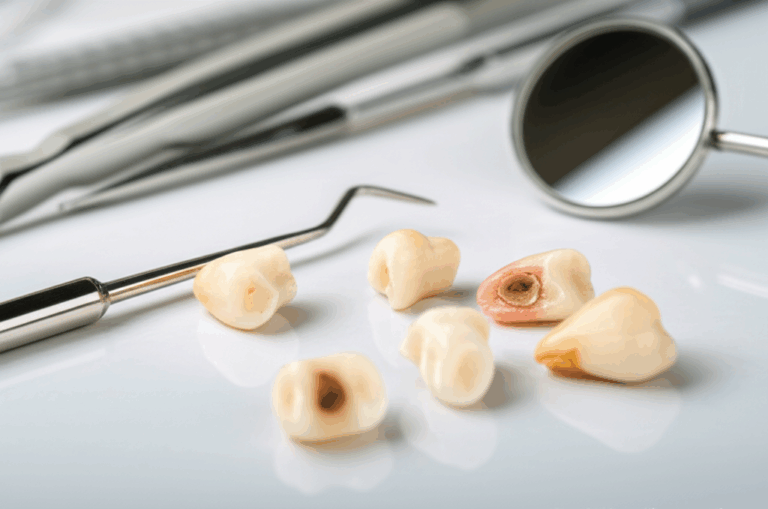
Jaw Pain: Doctor or Dentist? Your Friendly Guide to the Right Care
Have you found yourself stuck in the never-ending loop of asking, “Should I see my doctor or my dentist for this jaw pain?” Maybe you think it’s your wisdom teeth trying to come in. Or maybe you just have a stubborn ache that won’t go away. Jaw pain can really mess with your daily life, especially when you’re not sure who can help you best.
Guess what? You’re not alone! This question runs through the minds of lots of people every day. Jaw pain can have all sorts of causes—from a simple toothache to something as serious as a heart problem. So figuring out who to call can feel like a big task.
So let’s talk through it, step by step. I’ll break down what to look out for, what’s going on in your jaw, and what you should do—all clearly and without any scary fancy words. Whether your pain is just a little annoying, a constant ache, or a “whoa, what is THAT?” moment, you’re about to get the answers you need.
In This Article
1. Jaw Pain Confusion – Who Should You Call?
Jaw pain is one of those strange aches that seems to sit right between medicine and dentistry. It’s easy to feel lost—should you call your family doctor, or try to see your dentist? Hang on a second. Take a breath. This is a really normal problem to have, and it’s perfectly fine to not know the answer right away.
Here’s the big tip: Who you go to usually depends on what’s actually making your jaw hurt. Sometimes, you’ll need both a dentist and a doctor working together—think of it like building a team to help your jaw feel better.
But before you pick up your phone or start looking up “urgent jaw pain help near me,” let’s figure out what’s actually going on inside. That’s the first step to feeling clear and confident.
2. The Simple Science: What’s Going On in My Jaw?
Your jaw isn’t just a couple of bones; it’s a group of muscles, joints, nerves, teeth, and the all-important jaw joint (the TMJ—it’s like your jaw’s little hinge). And pain? Think of it like your body’s check-engine light. It’s letting you know something inside needs attention.
Here’s a quick way to tell who normally handles what:
- Dentist Stuff: Teeth and gums, dental infections, TMJ problems from grinding/clenching, wisdom teeth, bad bites, knocked out or broken teeth.
- Doctor Stuff: Nerve problems (like trigeminal neuralgia), infections that go past your teeth, arthritis, sinus or ear infections, and sometimes, signs of serious things (like heart problems).
- Sometimes Both: Infections or injuries that involve both your teeth and the rest of your face, jaw pain that doesn’t seem to fit in one box.
Think of your jaw as a busy train station where dental and doctor’s tracks cross. If the “pain train” is stuck or late, you need to figure out which platform (dentist or doctor) needs to help. Sometimes, both sides need to work together to get things moving smoothly.
3. When to See a Dentist for Jaw Pain
Dentists are your go-to helpers when your jaw pain is connected to your teeth, gums, or the jaw joint that lets you talk and eat. Here are the common signs you should go to the dentist:
- Tooth or Gum Pain: If you have a toothache, swollen gums, or a spot that hurts with hot, cold, or sweet stuff.
- Pain After Dental Work: Did you just get a filling, crown, or had a wisdom tooth out? Ongoing pain might mean something’s not right.
- Pain When Chewing or Biting: Chewing shouldn’t hurt.
- TMJ Problems: Do you hear popping, clicking, or grinding when you open your mouth? Does your jaw lock or do you have trouble opening wide?
- Teeth Grinding or Clenching: If you wake up with a tight jaw or get headaches by your temples, you might be grinding your teeth at night (bruxism).
- Wisdom Tooth Trouble: Swelling or pain at the very back of your jaw often points to those tricky wisdom teeth.
- Obvious Dental Problems: Swelling, a bump on your gum, a bad taste, or a broken tooth.
- Ear Pain Linked to Teeth: Sometimes, a hurting tooth can make your ear hurt.
Common Issues:
- Dental infection under your tooth or in your gums.
- Gum problems (gingivitis or periodontitis).
- TMJ troubles or jaw joint arthritis.
- Bad bite (your teeth don’t line up right).
- Accidents like a fall or biting wrong.
Not sure?
If your jaw pain seems tied to a certain tooth, or to chewing, or you see swollen/bleeding gums, call your dentist first. They have special tools (like X-rays) to find hidden dental problems.
4. When to See a Doctor (GP) for Jaw Pain
Doctors (like your GP or family doctor) are who you call when your jaw pain seems more like a medical puzzle—or when other symptoms go beyond your mouth.
Go to a doctor if you have:
- Fever or Feeling Sick: Pain with chills, night sweats, or feeling unwell.
- Swelling Away from Teeth: Puffy cheeks, neck or jaw—especially if it shows up suddenly.
- Pain with Headache: Especially at your temples or with changes in vision.
- Pain Running to Other Places: Jaw pain going down your chest, shoulder, or left arm.
- Numbness or Tingling: Could be a nerve or blood flow problem.
- Trouble Breathing or Swallowing: If you feel like your throat is closing up, get help fast.
- Injury or Accident: After a crash, fall, or getting hit in the face.
- Aching Joints Elsewhere: If other joints hurt, it could be arthritis.
- Very Strong Face Pain: Especially if it’s sharp, burning, or feels like a jolt—it could be nerve pain.
- Known Health Problems: If you already have heart issues, autoimmune diseases, or just had a bad sinus or ear infection.
Common Medical Causes:
- Sinus or ear infection.
- Nerve pain (like trigeminal neuralgia).
- Inflamed arteries near your temple (temporal arteritis).
- Salivary gland infection or mumps.
- Heart problems (like chest pain or heart attack).
- Illnesses that affect your whole body (like rheumatoid arthritis).
Good rule:
If your jaw pain comes with flu-like feelings, swelling not tied to a bad tooth, chest pain, or you just feel very unwell—call your doctor. They can do blood tests, scans, and check the bigger health picture.
5. When You Need Emergency Care: Red Flags to Never Ignore
Some jaw pain isn’t just a problem—it’s an emergency! Get help right now if you have any of these:
Call 911 or get to the ER if:
- Jaw pain with chest pain or tightness.
- Pain running down your left arm, neck, or back.
- Sudden weakness, numbness, trouble talking, or vision changes.
- (Possible stroke!)
- Swelling that makes it hard to breathe, swallow, or open your mouth.
- Really high fever, fast swelling in the face or neck, or confusion.
- Jaw stuck open or serious injury (broken/dislocated jaw).
Sounds scary, but it’s better to act fast. About 30% of heart attacks start with jaw pain, especially in women, and some infections can get worse quickly. Don’t wait or “see how it goes.”
6. How Professionals Diagnose Jaw Pain
Wondering what happens when you go for help? Here’s a look:
What Dentists Do
- Mouth Exam: Dentist checks your teeth, gums, and bite.
- Dental X-rays: Pictures to spot hidden problems, infections, or wisdom tooth issues.
- Jaw Joint Check: They’ll feel your jaw for clicks, pops, or sore spots.
- Bite Check: Is your bite off? They’ll look for it.
- History: Ask about stress, night habits (like grinding), recent dental work, and other health problems.
Special tools, like 3D scans (the kind found in a digital dental lab), can help spot things not seen by just looking.
What Doctors Do
- Physical Exam: Checking your head, neck, and jaw for sore spots or swelling.
- Vital Signs: Heart rate, blood pressure, temperature.
- Pictures/Scans: CT, MRI, or ultrasound if needed.
- Lab Tests: Blood work to look for infection or inflammation.
- Nerve & Heart Checks: Reflexes, heart beat, maybe an EKG if worried about your heart.
A good doctor asks about everything—even if it doesn’t seem to fit—just to be safe.
7. Treatment Options for Jaw Pain
You’ve figured out your symptoms. You’ve seen the right helper. What next? Time for solutions—things you can do at home, and things the pros can do.
Dentist Solutions
- Nightguards/Splints: If you grind your teeth, a night guard dental lab can make a custom mouth guard to protect your teeth and relax your jaw.
- Fixing Teeth: Fillings, crowns, root canals, or pulling teeth if needed.
- Treating Gums: Cleaning, medicine, or surgery if you have gum infection.
- Bite Fixes: Sometimes braces, or custom pieces from a dental lab, help your jaw feel better.
- TMJ Treatments: Jaw exercises, heat or cold packs, and in bad cases, special jaw shots.
- Fixing Infections: Draining pus, antibiotics, or easy surgeries.
Most dentists try simple things first. Using a mouth guard, for example, can stop grinding pain for lots of people.
Doctor Solutions
- Medicines: Antibiotics (for infection), pain killers, muscle relaxers, or nerve pain pills.
- Physical Therapy: Simple jaw moves to help stretch and relax.
- Stress Help: Deep breathing, meditation, or short chats with a counselor, if stress is making your jaw tight.
- Specialist Help: Neurologist (for nerve pain), ENT (for ear/sinus issues), or joint doctors (rheumatologist).
- Everyday Tips: Eating softer foods, no chewing gum, better sleep position.
Sometimes, a doctor and dentist work together, especially with weird or stubborn pain. This way, all bases are covered!
8. Prevention and Self-Care for Happier Jaws
A lot of jaw pain can be helped at home. Here’s what you can do right now:
- Lower Stress: Try relaxing your jaw, deep breathing, or meditation—it’s surprising how much we tense our faces.
- Don’t Chew Hard Stuff: Avoid ice, hard candy, popcorn kernels, and nuts if your jaw hurts.
- Use Warm Compress: A warm, wet towel over your jaw can help loosen tight muscles.
- Watch Your Posture: Don’t hold your phone between your shoulder and ear. Keep your chin up and neck straight.
- Jaw Moves: Light open/close and side-to-side stretches can help.
- Nightguards: If you grind your teeth, consider a mouth guard. Your dentist may suggest a custom guard from a special dental lab for retainers for comfort.
- See Your Dentist: Don’t skip regular check-ups—they catch little problems before they get big.
What NOT to do:
Chewing lots of gum, stretching your jaw too wide, or trying to “pop” your jaw usually makes it worse. If pain sticks around, see a professional.
9. Who Is This Advice For?
This guide is for anyone thinking, “My jaw hurts, but I don’t know who to call.” Maybe you’re:
- A teen dealing with wisdom teeth.
- An adult with clicks, tension, or jaw headaches.
- A parent worried about your child’s jaw.
- Stressed and clenching without knowing it.
- Pregnant (hormones can mess with your jaw too).
- An older adult—jaw joints get cranky at any age.
- Someone with jaw pain after an accident or dental work.
If you have the emergency signs from above, skip the tips—get help now. For new, unexplained, or lasting jaw pain, use this guide to pick where to start. Early help is always better than waiting!
10. Your Healthy Takeaway: Next Steps for Jaw Pain
You don’t need to handle this all alone.
Quick Reminders:
- Dental causes are the most common. Tooth/gum pain, TMJ symptoms, pain when chewing? Dentist first.
- Systemic symptoms—fever, swelling, numbness, pain that spreads—call your doctor.
- Some cases need both dentist and doctor, especially infections, injuries, or pain that won’t go away.
- For emergencies—chest pain, spreading pain, hard time swallowing or breathing, fast swelling, or other scary symptoms—call for help right away.
What to Do Next:
- Write down your symptoms: When did they start? What helps or makes it worse? Any other changes?
- Book with your dentist or doctor depending on your symptoms. Don’t be afraid to ask, “Is this for you, or should I see someone else?”
- Do gentle self-care: stress reduction, soft foods, keep your teeth clean.
You deserve care. Jaw pain is annoying, but now you have a clear plan. Trust your gut, get help, and soon you’ll be eating, laughing, and talking without pain.
Additional Resources
- Want to learn how custom dental fix-ups are made and shipped worldwide? Check out how a china dental lab supports dental care everywhere.
- If you’re curious about the newest technology for crowns and bridges, see how a dental ceramics lab can make your dental work look and feel more real.
And if you wonder about fixing teeth, dental implants, or rebuilding your smile, don’t be afraid to ask your dentist or explore more with our helpful partners.
You’ve got this. Your health—and your jaw—are in good hands.








